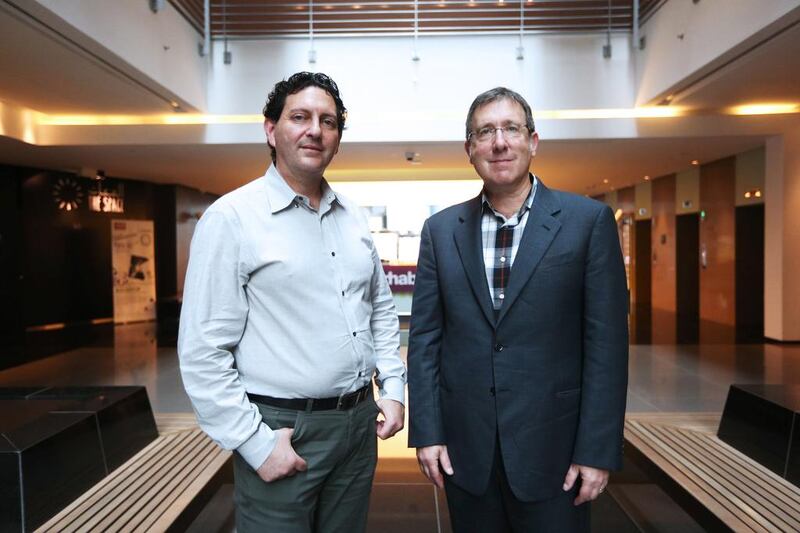Merrick Furst aims to change the way companies are born. The American professor has developed a process to help entrepreneurs start companies, believing that in the same way a bridge or an aeroplane is engineered, entrepreneurs can benefit from a form of mental engineering to work out whether their ideas are feasible. This month, Mr Furst was in Abu Dhabi at the invitation of New York University Abu Dhabi to deliver a lecture explaining his unique approach.
“Being able to do innovation and create a lot of wealth around it is on many people’s minds,” explains Mr Furst, an entrepreneur most of his life as well as a distinguished Artificial Intelligence academic. “But the way entrepreneurship has traditionally worked is a person has a vision, they convince people to give them money, and they go build it — the ‘if you build it they will come’ model. The evidence is that almost always fails.”
Two years ago the academic ran an experiment on behalf of Georgia Tech University, USM to find a more effective model for innovation.
“We had to invent a process, called ‘engineering the construction of start-ups’, and it was surprisingly successful,” he says.
“We recognised the reason humans do innovation the way they do is because of their ‘cognitive pathologies’ — cognitive errors that become pathological because people don’t notice them, that increase their risk of failure. People win Nobel Prizes for noticing cognitive errors in other fields, and it’s the same with entrepreneurs. We’ve developed a set of process-controlled methods that enable people to do innovation while avoiding the errors that up until now have caused most innovations to fail.”
Mr Furst then founded the Center for Startup Engineering within Georgia Tech, inviting companies to join its “Flashpoint” programme.
To make the project financially sustainable, he enlisted the entrepreneur Matt Chanoff to run the project as a company outside the university. Mr Chanoff now introduces teams from large corporations to sit among the start-ups and what they pay for the privilege enables Mr Furst to work with them. The duo also benefit financially from investing in the startups.
“It’s fun to watch entrepreneurs become wildly successful in ways they never thought they could,” says Mr Furst, adding that the programme now has 10 times more applicants than they can handle.
“The first stage, which takes four months, involves an intense process of doing experiments in the world,” says Mr Furst. “The end result is the entrepreneur sees something that was always there — just not apparent. Every week they’re forced to share with us how they currently see the world, and we force them to confront the fact that a lot of that may just be their fantasy, because they haven’t actually seen the world the way it is.
Mr Chanoff elaborates further: “Often when people say they’re being creative they have a great idea but actually they’re being very formulaic, copying what other people have done to create a company. What we’re doing is a lot closer to the creative process of Michelangelo, who looks at a block of stone and says: ‘What’s in this stone that is David?’ You can get rid of what’s not David, and that’s a creative process. Creativity is important, along with energy, fashion and purpose. We take people with those attributes and show them how to work in a way that helps them overcome the errors that affect most start-ups.”
One participant, Adam Ghetti, formed a business to protect personal data because he loathed big companies seeing what he wrote to his friends on Facebook. He wanted a product that would encrypt everything, so only his friends could view his thoughts.
“But once you imagine a thing, the mind makes the error of imagining people using it,” explains Mr Furst. “We asked Adam: ‘is there something the world can disclose to you that is actually meaningful for a large customer body?’ After three months, Adam discovered the big problem people working in regulated industries have. If you are the one managing technology for corporations, you need to enable people to use these tools to share information, but you need to protect the information that’s being shared. He made a technology so people in corporations could use whatever technology they wanted to communicate and no matter what they used, the information would be protected. The company is Ionic Security, and it’s now worth close to US$100 million. It became what it needed to be.”
The entrepreneurship gurus have now helped 35 companies who have collectively raised $65m from investors. They have also managed to halt the operations of a quarter of them, something they consider a success because a lot of time and money is often wasted on start-ups that are not working but continue to exist, since investors don’t typically know when to stop investing.
“We try to get the lemons to ripen early”, adds Mr Chanoff.
business@thenational.ae
Follow us on Twitter @Ind_Insights





